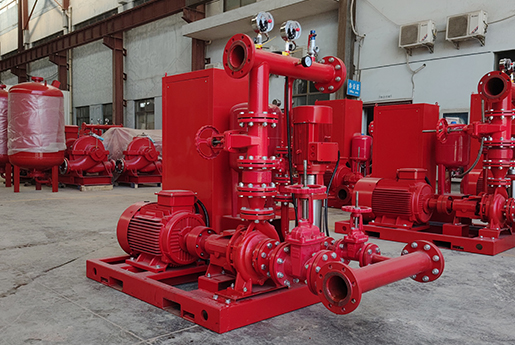How to maintain fire pumps in winter?
Nov 10, 2022
Share:
Fire pumps are extremely susceptible to freezing and cracking in the cold and will not work properly when damaged, endangering people's fire safety.
We all know that the density of water is usually 1 g/cm3, the density of ice is usually 0.9 g/cm3, when the water into ice, the volume will certainly become larger, resulting in pump shell expansion crack. Therefore, if water is still present in the pump body under low temperature conditions, the pump body is extremely prone to swelling and cracking. In order for the pump to be used effectively even in winter, we need to provide some protection for the fire pump against freezing and cracking in winter.

Firstly, make sure that the water inside the pump is emptied to prevent the pump from operating normally due to the return water, low external temperatures and frozen pipes. Secondly, the pump is exposed outdoors and can be wrapped in waste clothing, cotton wool, etc. to insulate the pump, water pipes, taps, etc. For frozen pumps or water pipes, it is recommended to use a towel on top of the water pipe and then use warm water to defrost it, not hot water or fire to avoid greater damage.
These are the measures to prevent freezing and cracking of water pumps. In addition to the maintenance of water pumps to prevent freezing and cracking, there are more maintenance methods to make the pumps run more efficiently and extend their service life. Regularly check the pump's impeller, check valve, bearings, seals and other perishable parts. Cast iron parts that are found to be rusted or worn should be renewed in time, cleaned with petrol, greased and reassembled.
Correct use and maintenance is an important prerequisite for the safe and efficient operation of fire pumps. For more expertise on fire pumps, please stay tuned to zjbetter's official website. The company's professional technical skills and excellent service are the choice of the majority of consumers, and we can provide you with professional services before and after the sale. Welcome your enquiry!
We all know that the density of water is usually 1 g/cm3, the density of ice is usually 0.9 g/cm3, when the water into ice, the volume will certainly become larger, resulting in pump shell expansion crack. Therefore, if water is still present in the pump body under low temperature conditions, the pump body is extremely prone to swelling and cracking. In order for the pump to be used effectively even in winter, we need to provide some protection for the fire pump against freezing and cracking in winter.

Firstly, make sure that the water inside the pump is emptied to prevent the pump from operating normally due to the return water, low external temperatures and frozen pipes. Secondly, the pump is exposed outdoors and can be wrapped in waste clothing, cotton wool, etc. to insulate the pump, water pipes, taps, etc. For frozen pumps or water pipes, it is recommended to use a towel on top of the water pipe and then use warm water to defrost it, not hot water or fire to avoid greater damage.
These are the measures to prevent freezing and cracking of water pumps. In addition to the maintenance of water pumps to prevent freezing and cracking, there are more maintenance methods to make the pumps run more efficiently and extend their service life. Regularly check the pump's impeller, check valve, bearings, seals and other perishable parts. Cast iron parts that are found to be rusted or worn should be renewed in time, cleaned with petrol, greased and reassembled.
Correct use and maintenance is an important prerequisite for the safe and efficient operation of fire pumps. For more expertise on fire pumps, please stay tuned to zjbetter's official website. The company's professional technical skills and excellent service are the choice of the majority of consumers, and we can provide you with professional services before and after the sale. Welcome your enquiry!

.png)
.png)

.png)


